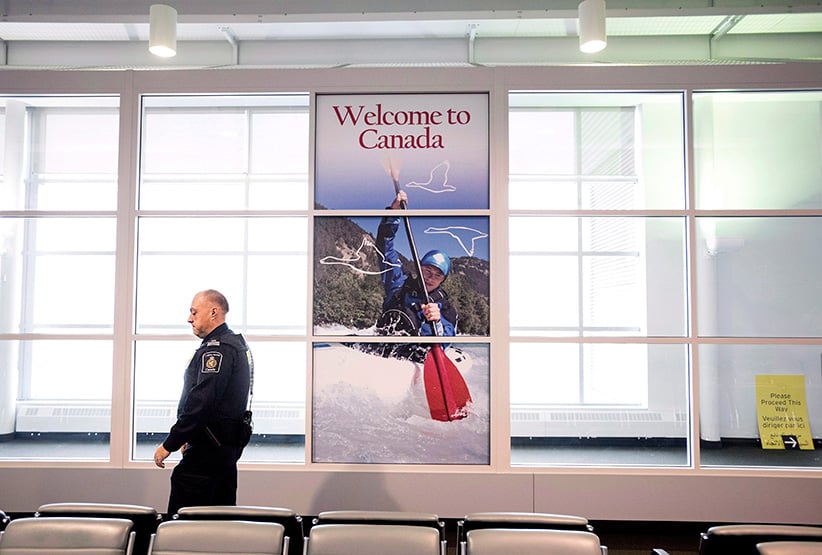Does Canada already have a Trumpian immigration policy?
It’s not just immigration supporters who look to Canada as an example. Immigration opponents also see this country as an example of immigration done right.
A Canadian Border Services agent walks past a welcoming sign at Gate 521 at Pearson International Airport in Toronto. (Darren Calabrese/CP)
Share

Canadians like to be noticed, and as immigration has become a key issue in the world, people are increasingly noticing Canada as an example of a country that does it right. Even before Donald Trump won the U.S. presidency on a platform of immigration restriction, American commentators were urging their compatriots to be more like Canada: even though 20 per cent of the population is foreign-born, a much higher percentage than most Western countries, most Canadians view immigration as beneficial to the country. So-called “Canadian exceptionalism” over immigration and multiculturalism is starting to spread around the world, as more observers agree that we really do accomplish these things better than anyone else.
“Canada is the least xenophobic country in the Western world,” ran the headline of an article on Vox, where Canadians were described as “by far the most open to and optimistic about immigration” and “the only real outlier” to the current trend toward nativism. “Canada should be a role model,” Fareed Zakaria declared in the Washington Post late last year, praising the country for its “smart policies” on immigration and “strong assimilation.” Canadians have been happy to accept this praise and to celebrate Canada as an antidote to more fractious Western countries; Ahmed Hussen, Prime Minister Trudeau’s new minister of immigration, told the press on his appointment: “I am extremely proud of our country’s history as a place of asylum, a place that opens its doors and hearts to new immigrants and refugees.” The global unrest over immigration could prove to be a form of free advertising for Canada.
But there’s something that complicates the picture of Canada as the friendliest country on Earth: it’s not just immigration supporters who have been looking to us as an example. Immigration opponents also like to point to Canada as an example of immigration done right—and at least one of those fans may be in the Trump administration. After the U.S. election, the Washington Post talked to an anonymous Trump aide who “cited as a model Canada’s system of awarding points to immigrants based on education, job skills, language proficiency, age and other criteria,” as opposed to the U.S. system’s emphasis on reunifying families.
Canada’s emphasis on high-skilled immigration, and its relatively easy entry for people who already have jobs lined up in the country, may make it harder to stereotype immigrants as not contributing to society. That could be why Canada is celebrated not just by immigration liberals, but conservatives who want a moderate regime of immigration restriction. Michael Brendan Dougherty, The Week’s conservative columnist, called for U.S. states to “imitate Canada’s provinces in making known the kinds of workers or employment that are in demand.” F.H. Buckley, a Canadian-born U.S. law professor who supported Trump, wrote an article calling for the president-elect to look to Canada, particularly the way Canadian immigration levels are “tailored to the needs of different industries in different parts of the country.” It could be that one reason Canada hasn’t had a Trump-style immigration revolt is that we already have a moderately Trumpian immigration system.
It may sound strange that Canada could simultaneously inspire people who want more immigration and those who want less. No doubt part of Canada’s relative comfort with immigration is connected to the fact that we have significant geographical and political differences to begin with. Unlike the U.S., Canada doesn’t have high levels of unauthorized immigration, in large part because it doesn’t share a border with a much poorer country. The Wall Street Journal published a long piece called “How Canada got immigration right,” but it waited until near the end of the article to point out that only six per cent of Canadian immigrants are unauthorized, compared to around one-third of U.S. immigrants, which means that the U.S. couldn’t have Canada’s exact immigration system even if it wanted to. Likewise, Canada has more control over migration than countries that are part of the European Union. As a result, Canada is insulated from Trump-like demagoguery against illegal border crossings, or a movement like Brexit. Still, it seems likely that if those other countries had Canada’s system, the nativist movements wouldn’t have gotten any momentum.
That doesn’t mean Canadians shouldn’t feel justifiable pride in avoiding the troubles other countries have had—at least, avoiding them so far. It just means Canada’s success might not be solely due to our superior tolerance. It’s still pretty hard to move to Canada—and that may be one of the reasons so many people in the U.S. and U.K. are starting to wish they could.